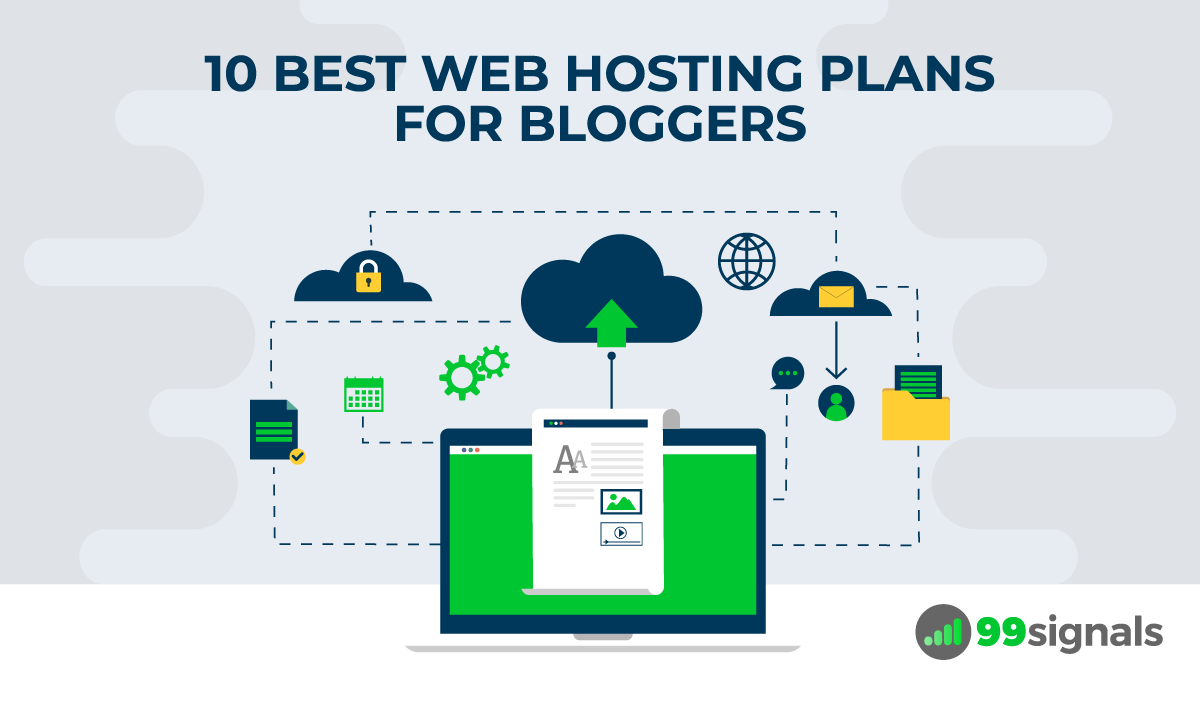 For over 5 years, I've been running my blog that's now attracting close to 100,000 monthly readers. When you reach such audiences, you can rightfully claim to be a professional blogger. And any blogger that's only starting out likely wants to get into the pro ranks — to expand the readership, generate income, and deliver the message to the widest audience possible.
For over 5 years, I've been running my blog that's now attracting close to 100,000 monthly readers. When you reach such audiences, you can rightfully claim to be a professional blogger. And any blogger that's only starting out likely wants to get into the pro ranks — to expand the readership, generate income, and deliver the message to the widest audience possible.
And from my first-hand experience, I can assure you — the most important decision you'll have to make before you even think of your very first published piece is about the web hosting that will power up your blog.
So before you worry about the competition, content quality, ideation, outreach, and many more things to work on, you have to pick the most reliable and intuitive web hosting service. And this is where it gets challenging.
Knowing this and having a lot of incoming requests from my readers, I've decided to share my tested and proven top web hosting plans that should meet your entire blogging needs.
Now without any further ado, let's uncover the most blogging-fit web hosting service providers. I'll be listing them in the order of personal preference, but do make sure to read all the way through the end.
Table of Contents
- Top 10 Web Hosting Plans for Bloggers
- 1. DreamHost: Review & Assessment
- 2. BlueHost: Review & Assessment
- 3. GoDaddy: Review & Assessment
- 4. Namecheap: Review & Assessment
- Alternative Web Hosting Plans for Bloggers
- 5. Hostinger: Quick Review & Assessment
- 6. SiteGround: Quick Review & Assessment
- 7. InMotion: Quick Review & Assessment
- 8. HostGator: Quick Review & Assessment
- 9. A2 Hosting: Quick Review & Assessment
- 10. Cloudways: Quick Review & Assessment
- Choosing the Best Web Hosting Solution: Top Criteria to Factor In
- Final Thoughts on Web Hosting Plans
Top 10 Web Hosting Plans for Bloggers
Before I get into a more detailed review of each web hosting platform, I'll share an easy-to-use table where you can see all the most important features of each provider.
This 'in a nutshell' view should help you cross-reference each web hosting service and decide on the most suitable solution for your particular needs.
[table id=33 /]
1. DreamHost: Review & Assessment
With 42% of all blogs being run on WordPress, chances are yours is as well. So you might want to consider a service that earned WordPress' vote of confidence.
DreamHost is a WordPress-recommended web hosting service that's been one of the longest-running hosting providers on the web.
DreamHost can be defined in three words: Fast. Reliable. Affordable. Essentially, it checks all the marks when it comes to defining the top web hosting services.
DreamHost: Performance and Uptime
DreamHost's uptime is at 100% (they do compensate if you face an unlikely downtime) and it delivers a higher than average load time, making it one of the most reliable web hosting service providers out there.
The platform also comes with a free WordPress plugin that can boost your site's load time, so its average speed time can always be enhanced whenever you feel like your user experience starts lagging behind.
DreamHost: Top Features
The most important thing is that DreamHost is very easy to set up. It's designed to offer some of the most intuitive user experiences among other web hosting service providers so you won't have to waste time and resources setting up your blog.
Moreover, you can customize the control panel the way you like — a feature often missing within most web hosting providers.
Here are some of the top DreamHost features you'll surely benefit from:
Large storage and unlimited bandwidth
When just starting out, you might not want to think about storage and traffic.
But if and when your blog starts growing, you will find these features to be as important as speed and uptime. DreamHost is very generous with both, giving its users 50 GB storage and unlimited bandwidth — so you won't have to spend extra cash adding up bandwidth to your expanding blog.
Money-back guarantee
DreamHost is pretty generous allowing you to ask for a return 97-day into web hosting usage. This shows confidence and a proven service quality check.
Pricing transparency
What I personally love the most about DreamHost is that it's very honest in its pricing policy. While many other web hosting providers overload users with a plethora of plans and hidden costs (think of bandwidth limits, storage limits, etc.), DreamHost never charges for any extras.
Once you hit your basic plan's limit, you can move on to a higher-priced package that comes with pretty much everything unlimited.
Top perks
Even the most basic DreamHost plan comes with a lot of goodness added up on top of the basic features. Just for $2.59/mo, you will have access to a WP website builder, free domain, free SSL certificate, and free automated WordPress migrations.
DreamHost: Customer Support
Considering its very intuitive and easy-to-use interface and pricing structure, you should not encounter any issues during the setup and usage.
But in case you do, DreamHost offers fast response time with a live chat feature available during business hours, and an option to send them an email that gets addressed within 24 hours. You can even leave a request to call you back in case you're more of a phone person.
Top the tech support with a discussion forum and a very extensive knowledge base, you won't have to wait for more than a day to get an answer to even the most challenging DreamHost questions.
DreamHost: Pricing Plans
Being a web hosting provider that's officially endorsed by WordPress, even the cheapest DreamHost plan comes with some notable features. It includes a WP website builder and free automated WP migrations, making it the best-suited service for WordPress users.
Here's the current pricing structure of DreamHost's shared hosting plans:
Their most basic shared hosting plan, Shared Starter, includes features like:
- 1 website
- Free domain included
- Unlimited traffic
- WP website builder
- Free Automated WordPress Migrations
- Fast SSD storage
- Free SSL certificate
- 3 year, 1 year, and monthly plans
As your blog grows and you gain more readers and subscribers, you may want to upgrade to one of DreamHost's VPN hosting plans:
DreamHost's most basic VPS hosting plan, Basic VPS ($10/mo), includes:
- 1 GB RAM
- 30 GB SSD storage
- Unlimited websites
- Unlimited traffic
- Free SSL certificate(s)
- Unlimited email @ your domain
If you're just starting out, I'd highly recommend you start with DreamHost's Shared Starter plan ($2.59/mo).
The only feature currently lacking from DreamHost is that its starter plan doesn't allow you to create an email account by default. But this option is available for a separate price ($1.67/mo). If you go for the unlimited plan ($3.59/mo), you will have an unlimited email account.
2. BlueHost: Review & Assessment
Also WordPress-recommended, BlueHost is another strong contender on the blogger-specific web hosting market. Launched way back in 1996, BlueHost has cemented its place as one of the most reliable and affordable web hosting services on the market.
BlueHost: Performance and Uptime
BlueHost's uptime is at 99.99%, which is close to DreamHost's 100%. But the former doesn't compensate you in case you face any issues with the downtime.
Also, BlueHost shows a somewhat less reliable loading speed — in some cases, it goes beyond all expectations loading the page under 0.05 seconds, in other cases the load time goes up to 3.4 seconds, which can be a big issue.
BlueHost: Top Features
BlueHost and DreamHost offer very close deals when it comes to both basic and more advanced plans. Just like its counterpart, BlueHost features:
- 50 GB storage and unlimited bandwidth.
- Money-back guarantee (only it's valid for 30 days vs. DreamHost's 97 days).
- Free domain and SSL certificate are also included within BlueHost's basic plan, but you'll have to pay extra for WP migrations.
BlueHost: Customer Support
Customer support is probably BlueHost's strongest trait. BlueHost's support teams don't just offer BlueHost-specific help, they can also help you out in case you're facing any issues with your WordPress setup.
With 24/7 support available through live chat, email, and phone, you can expect your issues to be resolved in no time.
BlueHost: Pricing Plans
Now when it comes to pricing, it may seem like DreamHost and BlueHost are very similar in this regard as well. But BlueHost is not as straightforward.
If you don't want to make a three-year commitment to either service (this is where their pricing is pretty much identical), you will start to see the difference:
- Unlike DreamHost, BlueHost doesn't offer a monthly plan.
- For an annual shared hosting plan, you'll have to pay $4.95/mo (Basic plan), while at DreamHost, the cost will only go up to $2.95/mo.
Moreover, if you are ready to consider a pricier plan that also goes all-unlimited, at DreamHost you will only pay $3.95/mo, while BlueHost charges $13.95/mo.
Their best plan for beginners, the Basic plan ($4.95/mo), includes the following:
- 1 website
- 50 GB SSD storage
- Custom themes
- 24/7 customer support
- Free domain – 1 year
- Free SSL certificate
- Free CDN included
- WordPress integration
- Drag and drop functionality
BlueHost's highest-tier shared hosing plan, the Pro plan (16.95/mo when billed annually), upgrades you to:
- Unlimited websites
- Unlimited SSD storage
- Optimized CPU resources
- Free domain privacy
- Free automated backup
- Free dedicated IP
If you're just starting out, BlueHost's budget-friendly basic plan should be right up your alley.
3. GoDaddy: Review & Assessment
GoDaddy is very well-known outside of the blogging hemisphere. It's probably one of the most popular web hosting providers worldwide with very strong brand localization. But let's see if it's all that suitable for up-and-coming bloggers.
GoDaddy: Performance and Uptime
With average load time ranging from 0.03 to 0.51 seconds and 99.97% uptime, GoDaddy is probably the strongest market layer when it comes to performance.
Built to operate sites of any size and complexity, GoDaddy's teams have really mastered the art of web hosting reliability.
GoDaddy: Top Features
Being a web hosting for sites of all kinds, security is at the core of GoDaddy's solution. So while many of the perks are indeed missing from this web hosting provider, it does offer some high-end security perks:
- Automatic malware scans on a daily basis
- Everyday backups with the option to restore in one click.
GoDaddy also comes with a free domain (and email if you're subscribing to its annual plan), and amazingly has built-in sign-up forms you can leverage to build up your email base, collect leads, and run proper marketing campaigns.
Customer support-wise, GoDaddy doesn't differentiate between plans – so even if you're using the cheapest option in town, you can expect the same level of support – 24/7 via phone, email, and chat.
GoDaddy: Limitations
As GoDaddy was never intended as a blogger-specific platform, its lower pricing tier doesn't offer as much freedom as the rest of the solutions we already mentioned.
If you want to stay under the cheapest plan, you will only have 25 GB of storage and be limited to 25,000 monthly visitors.
While this may be okay for the start, you will have to move up a package when your blog starts to gain some traction, and this is where GoDaddy will start to get more pricey and less competitive with other more blogger-friendly platforms.
Also, in regard to perks offered by other solutions, don't expect a free SSL certificate or access to cPanel.
GoDaddy: Pricing Plans
Now at a first glance, GoDaddy's pricing doesn't seem so overwhelming. The introductory package starts at $5.99/mo, which is already twice the price of the previous solutions. But even if you're okay with the higher price and a more limited feature set, one year into the usage, the price will go up to $8.99/mo.
GoDaddy's lowest-tier shared hosing plan, the Economy plan ($5.99/mo), features:
- 1 website
- 25 GB storage
- 10 databases
- Unmetered bandwidth
- Free 1-click WordPress install
- Free domain
GoDaddy's highest-tier shared hosting plan, the Maximum plan ($19.99/mo), upgrades you to:
- 50 websites
- 100 GB storage
- 100 databases
- Free SSL certificates for all your websites
- Free Microsoft 365 email (1 year)
- Increased processing power and speed
While GoDaddy is a very superior solution in regard to reliability and web security, I don't think beginner bloggers should worry about these things to the point where they should pay triple the price for a solution that offers fewer perks than the rest.
4. Namecheap: Review & Assessment
Namecheap is widely known as the place you go to in the quest for domain name registration. But it also provides web hosting services.
Now let's see if their web hosting solution is as top-level as their domain registration.
Namecheap: Performance and Uptime
Just like DreamHost, Namecheap promises 100% uptime and compensation in the form of account credits in case you encounter any issues there. But speed-wise, it is slightly inferior compared to the rest — the average load speed is at 0.83 seconds, which is slightly more than readers expect from a fast-running blog.
Namecheap: Top Features
Even the most basic Namecheap web hosting solution is power-packed with some amazing features (some of them not present across other providers):
- 20 GB of storage and unlimited bandwidth
- 30 email accounts
- Basic control panel features
- Free website builder (not limited to WordPress)
- Free domain name, SSL certificate, and privacy protection (first year only)
- Free site migration
- Free CDN that includes a basic anti-DDoS system, and a traffic limit of up to 50 GB a month.
Namecheap also comes with superb customer support available with a 24/7 live chat and ticketing service via a help desk.
Namecheap: Pricing Plans
Namecheap does live up to its name and offers some of the cheapest rates for its web hosting service. For the first two years, you will only have to pay $1.44/mo, and the price will then go up to $2.88, making it comparable to DreamHost and BlueHost.
Namecheap's most basic plan, the Stellar plan ($1.44/mo), includes features like:
- Free domain
- 3 websites
- 20 GB SSD
- Free CDN
- Free SSL certificate (1 year)
- Free website builder
- Unmetered bandwidth
- 30-day money-back guarantee
Namecheap's highest-tier shared web hosting plan, the Stellar Business plan ($4.44/mo), upgrades you to:
- Unlimited websites
- 50 GB SSD
- AutoBackup and cloud storage
While in terms of pricing and features, Namecheap seems like a solid solution for blogging, its reliability is somewhat under question as speed can really be the make-or-break factor of your blogging success.
Alternative Web Hosting Plans for Bloggers
So far, I've covered some of the most prominent web hosting solutions — and those I've tried and tested myself and can recommend to any blogger out there.
But of course, there are plenty of other providers that also feature attractive web hosting offers for bloggers.
As I haven't had a personal experience with these platforms, I will only highlight the ones with the top reputation within the blogosphere and list some of their most prominent features.
5. Hostinger: Quick Review & Assessment
Hostinger's incredibly affordable price does imply that its cheapest $0.99/mo package doesn't come with many of the perks we saw above — no free domain, unlimited bandwidth, and traffic limitations.
So Hostinger could be a good solution for bloggers that are just starting out — as you will have to throw in extra costs as soon as your blogging business starts growing. And even before you start (think of domain name and bandwidth costs).
Hostinger: Performance and Uptime
Hostinger is very reliable and comes with an impressive loading speed. You also shouldn't expect much downtime, although its 99.91% uptime is slightly lower than the averages we see with other web hosting providers I've reviewed.
Hostinger: Top Features
- 30 GB of storage
- 10,000 monthly visits limit
- One free email account
- Free SSL certificate
- Weekly backups
Hostinger: Pricing Plans
Of course, Hostinger's most attractive feature is the pricing. But this $1.39/mo offer comes with a four-year commitment and the price goes up to $2.99/mo once you renew your deal.
And as mentioned, you will have to face some substantial extra costs as Hostinger doesn't offer many of the free perks others provide.
Hostinger's basic plan ($1.39/mo) includes the following features:
- 1 website
- 30 GB SSD storage
- 1 email account
- Free SSL certificate
- 100 GB bandwidth
- 30-day money-back guarantee
- 24/7/365 support
- 99.9% uptime guarantee
6. SiteGround: Quick Review & Assessment
This web hosting service provides a lot of free features for a slightly higher than average pricing. But you should think twice before paying a bit extra, asking yourself whether you really need all these perks.
SiteGround: Performance and Uptime
While SiteGround's uptime is at 99.91% — not the top reliability you'd expect, speed-wise SiteGround looks very attractive with its 0.37-second-average.
SiteGround: Top Features
SiteGround has most of the features we mentioned across other solutions, but it comes with plenty of free perks:
- WP install and migrator
- CDN
- SSL certificate
- HTTPS certificate
- One email account
- Unmetered traffic
- Daily backups
Siteground: Pricing Plans
If you're only at the start of your blogging journey, this might not be the top solution to pick at that stage as you might not need all the amazing free features that come even with its cheapest plan that comes at $3.99/mo.
Once your one-year contract expires, you will have to start paying $12/99/mo.
Here's what SiteGround's lowest-tier plan, the StartUp plan, includes:
- 1 website
- 10 GB web space
- Unmetered traffic
- Free SSL certificate
- Daily backup
- Free CDN
- Free email
- Unlimited databases
- 30-day money-back guarantee
Visit SiteGround to learn more
7. InMotion: Quick Review & Assessment
InMotion is a really great solution for more established bloggers — features included within its cheapest plan are more suitable to blogging pros that are already managing multiple accounts and need a single point of entry to all of them.
InMotion: Performance and Uptime
With 99.97% uptime and a surprisingly low 0.8-second speed, InMotion doesn't provide the reliability you'd expect from its pricing range.
InMotion: Top Features
- 2 websites
- Free domain and SSL certificate
- Unlimited disk space and bandwidth
- 10 email accounts
- $150 ad credits
- DDoS and hack protection
InMotion: Pricing Plans
The cheapest two-year plan comes at $5.99/mo, with the longest money-back guarantee (90 days) across the board. If you consider all the free perks that come with the Launch package, InMotion appears to offer a good value per dollar.
InMotion's lowest-tier plan, the Launch plan ($5.99/mo), includes features like:
- 2 websites
- 50 GB SSD storage
- Free domain and SSL
- Unlimited bandwidth
- 10 email accounts
- 24/7/365 support
8. HostGator: Quick Review & Assessment
With its impressive uptime, low-average pricing, and especially unlimited storage and bandwidth, HostGator can be a great web hosting solution. But make sure to read through the bullets below as HostGator might have some underlying problems if you come from a certain location and breach their ambiguous terms & conditions.
HostGator: Performance and Uptime
On average, HostGator comes with an impressive 99.99% uptime and 0.7 to 8-second loading speed. But it's known to have some downtime and speed issues depending on your location, so make sure to check this before you make your choice.
HostGator: Top Features
- Free domain
- Free SSL certificate
- Free cPanel/WP website transfer
HostGator: Pricing Plans
While HostGator offers some attractive pricing ($2.75/mo), especially considering its lack of any storage and bandwidth limits, its T&C mentions that you will be asked to reduce your usage when you reach 25% of their system resources.
Here's what their basic plan, Hatchling Plan, includes:
- 1 website
- Unmetered bandwidth
- Free SSL certificate
- Free domain included
- One-click WordPress installs
- 24/7/365 support
9. A2 Hosting: Quick Review & Assessment
If lightning-fast site speed is the most important thing to you as a blogger, A2 Hosting is the web hosting service to pick. While it has fewer free features (e.g. no free domain) than the rest, it does look pretty solid in all other areas, especially when it comes to reliability.
A2 Hosting: Performance and Uptime
A2 Hosting's 99.95% uptime and mind-blowing 0.036-second average speed turn it into one of the strongest web hosting contenders in terms of reliability.
A2 Hosting: Top Features
- 100 GB of storage
- Free SSL & HTTPS certificate
- Free site migration
- Hack and virus scanning + DDoS protection
A2 Hosting: Pricing Plans
With a three-year commitment, A2 Hosting's cheapest plan comes at $2.99/mo. After that, they will charge you $10.99/mo if you decide to stay on the cheapest plan.
A2 Hosting's Startup plan ($2.99/mo) includes features like:
- 1 website
- 100 GB SSD storage
- Free and easy site migration
- Unlimited email accounts
- 24/7/365 support
- Free SSL certificate
- Free website builder
Visit A2 Hosting to learn more
10. Cloudways: Quick Review & Assessment
To wrap up this list of reviews, I've picked a service that has a slightly different pricing model. Cloudways is a pay-as-you-go web hosting service provider that comes without any hidden charges.
Cloudways: Performance and Uptime
It's nothing but top-notch – the uptime is at 99.99% and the average load time is 0.4 seconds.
Cloudways: Top Features
- 25 GB of storage
- 1TB of bandwidth
- Free SSL certificate
- A choice between various cloud service providers (Digital Ocean, Google Cloud, AWS, and others)
- Easy-to-understand pricing structure
Cloudways: Pricing Plans
Simply $10/mo and no hidden costs or reasons to worry about the price going up once you're past a certain annual/biannual commitment.
Cloudways' lowest-tier plan ($10/mo) gets you:
- 1 website
- 25 GB storage
- 1 TB bandwidth
- Free SSL certificate
- 24/7/365 support
- Automated backups
- CDN add-on
- Dedicated firewalls
Choosing the Best Web Hosting Solution: Top Criteria to Factor In
With hundreds of solutions that claim to be the "top choice" for bloggers, you have to choose the one that best meets the key criteria:
Affordability vs Features
With web hosting, a high price does not necessarily imply top service, as you may simply pay for features you don't really need. So you have to make sure your web hosting plan does cover your needs but doesn't entice you to pay extra for features you will never implement on your blog.
Reliability
Speed and uptime are two of the most important features of any web hosting. Low speed will negatively affect your SEO and lousy uptime can cost you your readership. As much as you can invest in building a loyal audience, no one will put up with a blog that goes down every now and then, or takes too long to load.
Customer Support
While the perfect web hosting service should be as intuitive as it gets, there will be times when you might need some expert help. And you want to pick a platform that has a prompt and on-point response team that will deal with your issue in no time.
Final Thoughts on Web Hosting Plans
Picked right, good hosting will add up reputation and authority to your blog, helping your Google ranks, bringing in more visitors, and, hence, allowing you to generate more income.
Now that you are armed with all the info about the top web hosting service providers, you can decide which factor prevails over the rest for your particular needs — and make a smart choice that will underlie the success of your blog.
If you found this article useful, please share it on Twitter using the link below:
Related Articles


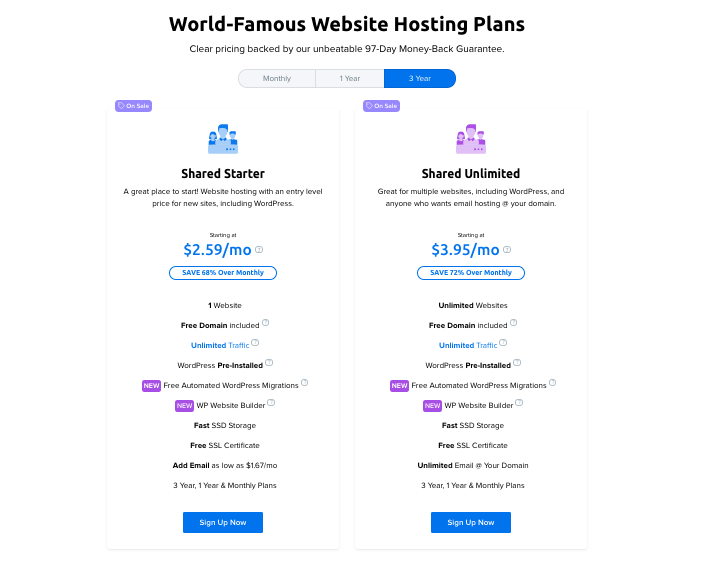
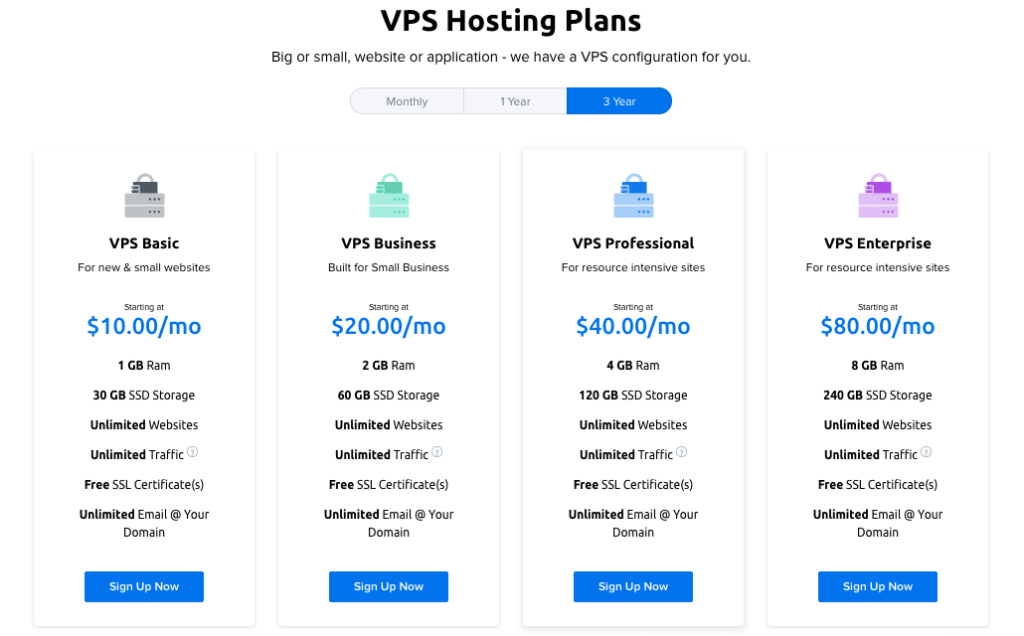

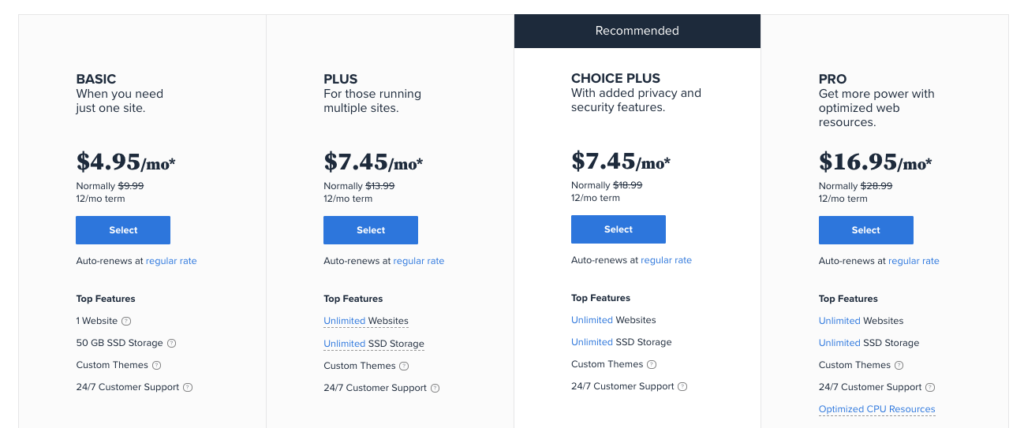
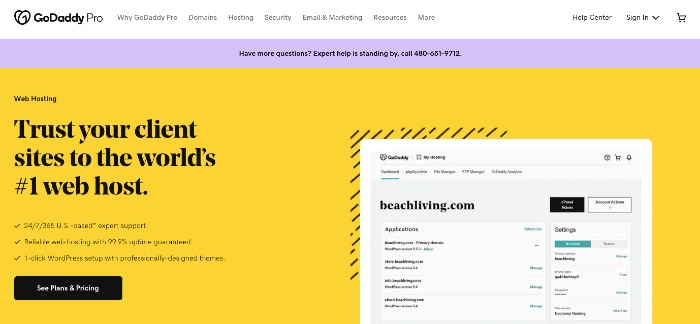
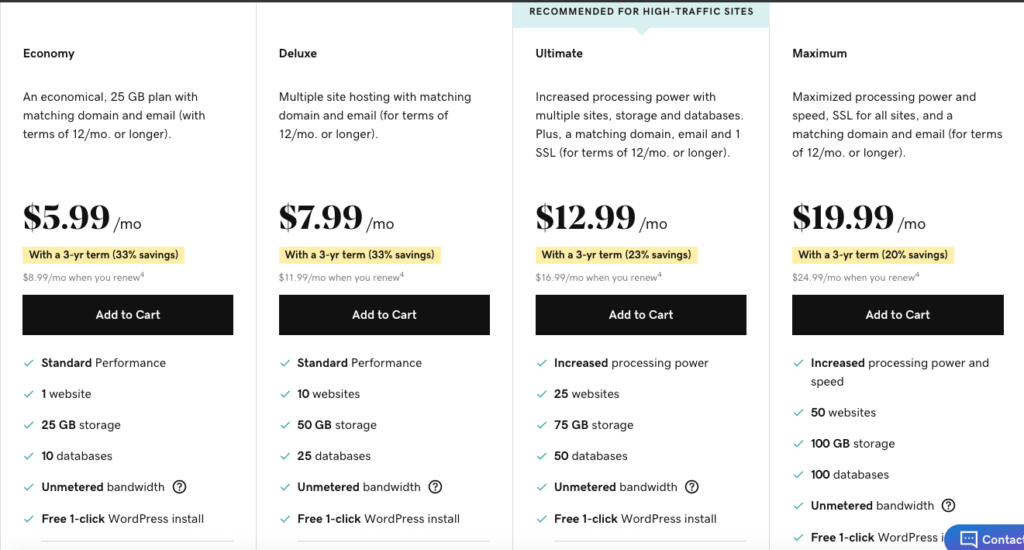
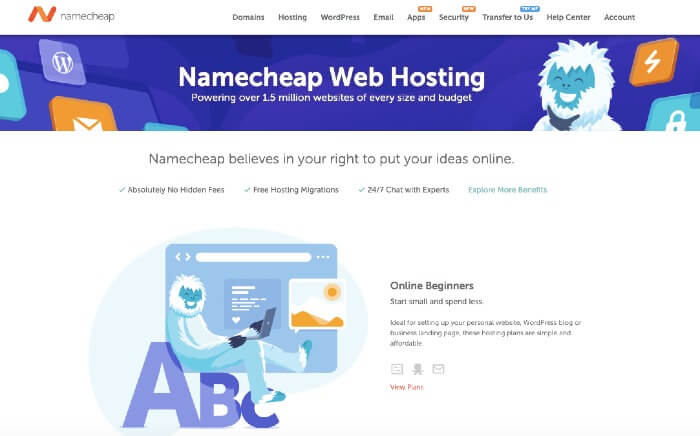
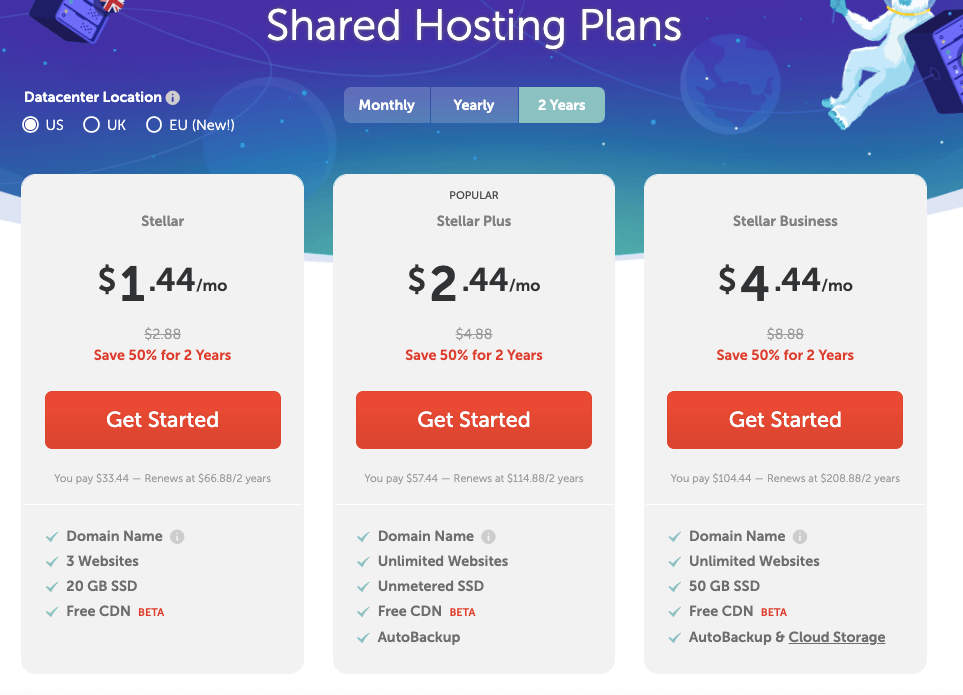

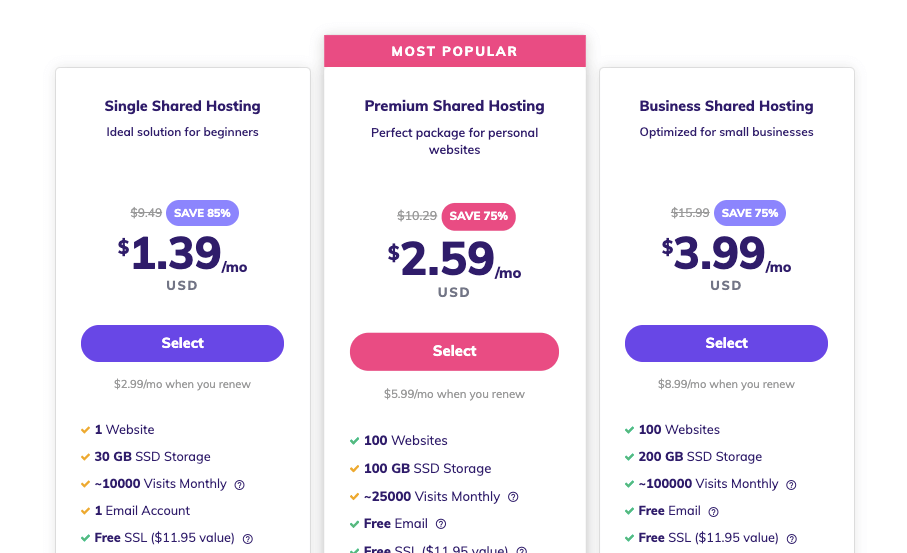
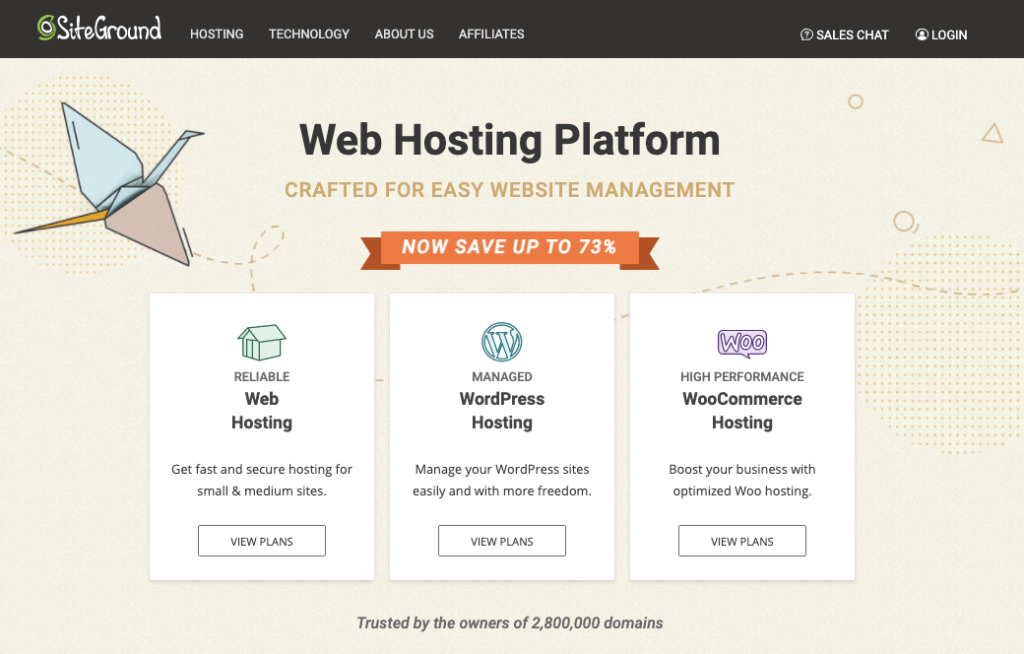
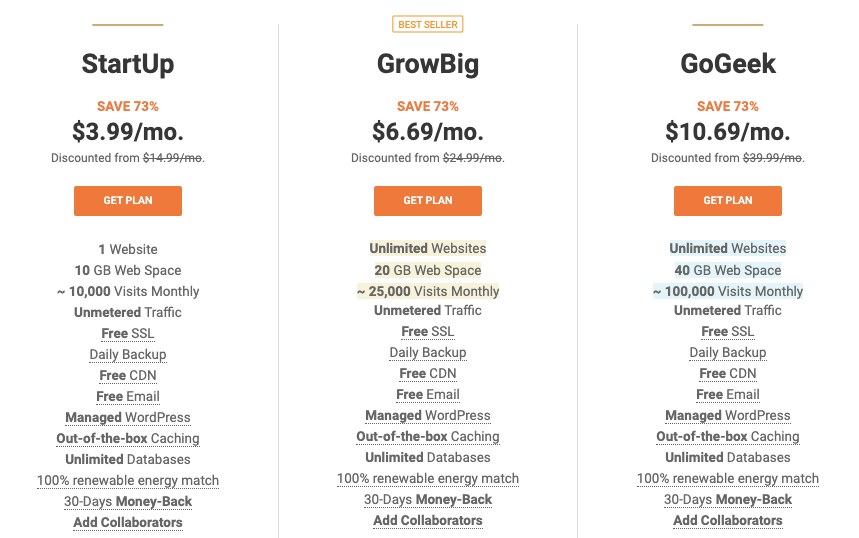
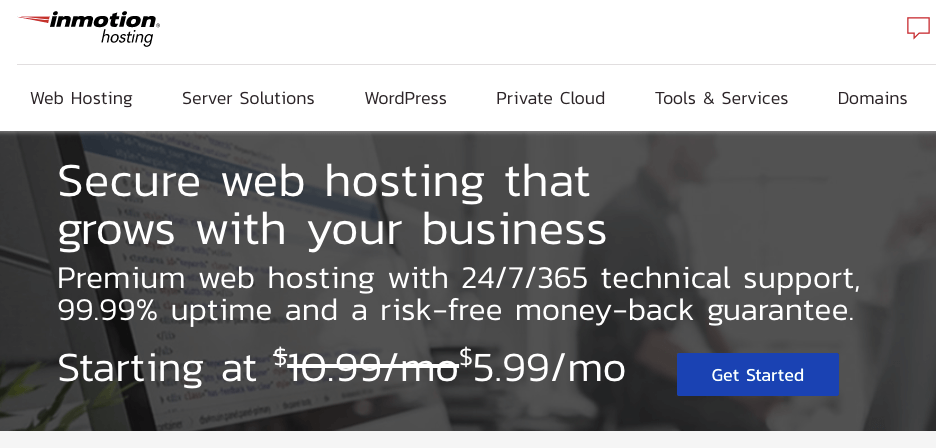
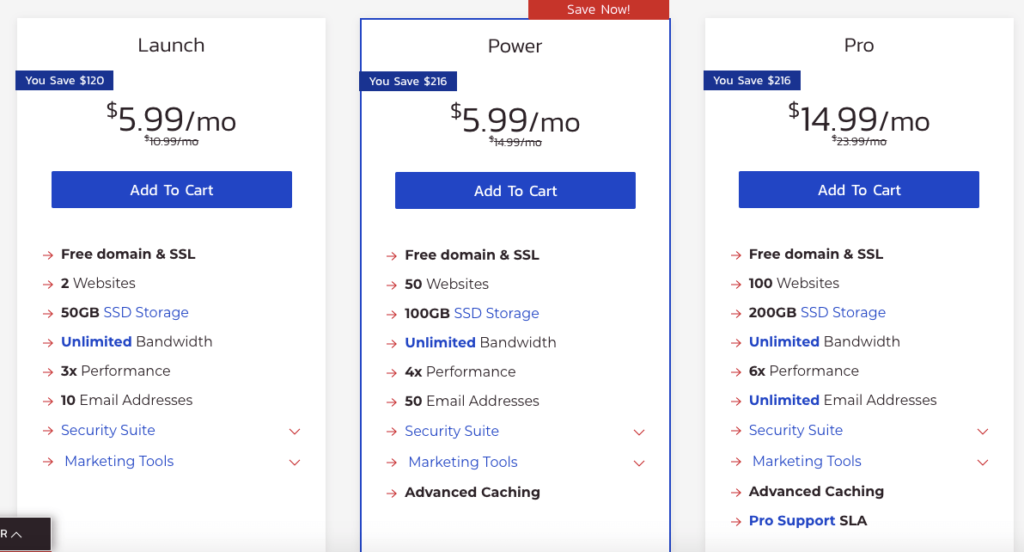
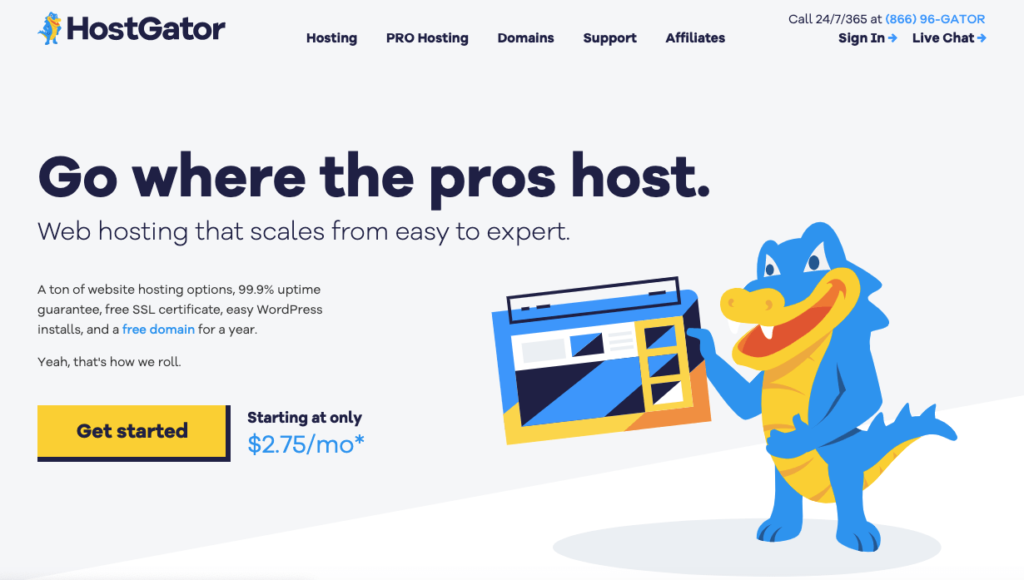
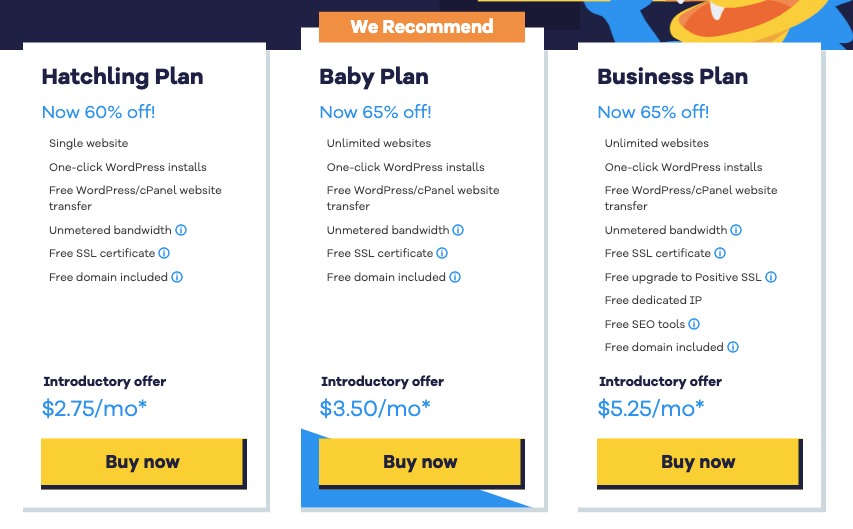

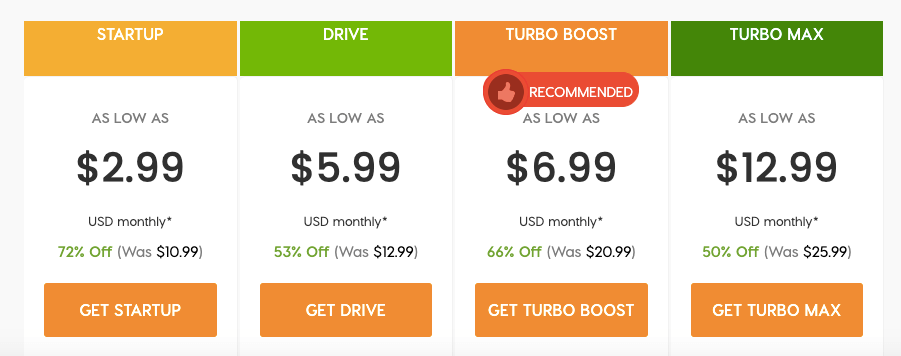

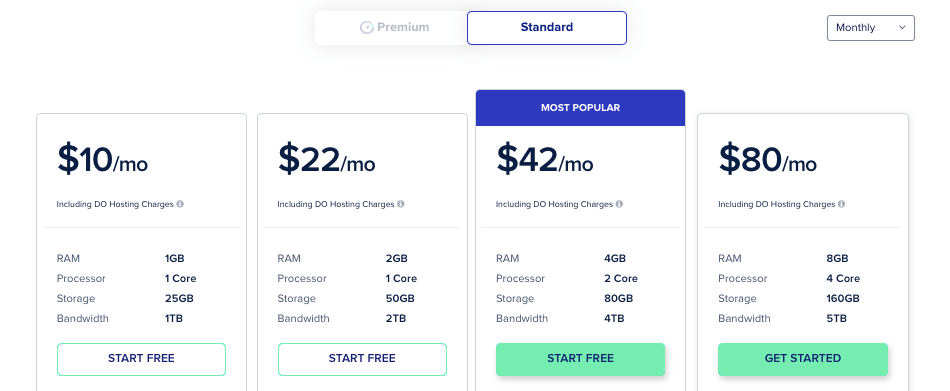
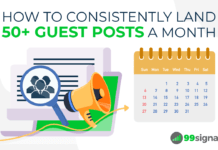








Thanks for sharing informative content…
As for me, here are my take
1 Bluehost: This web hosting company is one of the most popular ones and offers a variety of plans for bloggers. All of their plans include a free domain name, unlimited storage, and unlimited bandwidth.
2. InMotion Hosting: Another great option for bloggers is InMotion Hosting. They offer a wide range of web hosting options, including WordPress hosting, VPS hosting, and shared hosting plans.
3. WP Engine: WP Engine is a great choice for WordPress bloggers who need hostings specifically tailored to WordPress websites. Their plans come with built-in caching, automatic updates, and malware protection.
Quite informative on hosting plan to meet your specific requirment.